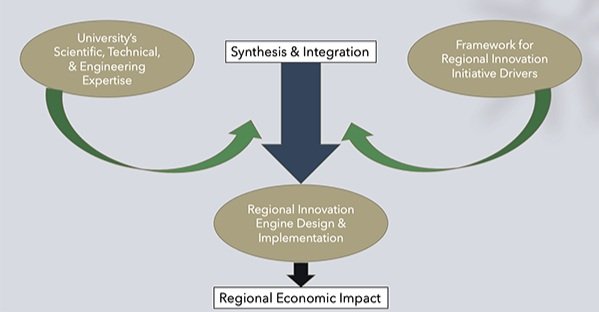
REGIONAL INNOVATION SOLUTIONS
REGIONAL INNOVATION SOLUTIONS
The Critical Step: Synthesis and Integration
With increasingly abundant sources of federal and state funding available for regional innovation, a generational opportunity exists for both regions and their university partners to design: 1) a regional innovation engine or hub, 2) a regional initiative, 3) a new intermediary organization, or 4) a custom solution that produce transformative impacts. The fundamental opportunity here is bringing university expertise into frameworks associated with regional economic drivers. Both region and university need pathways to succeed.
Our Franklin Solution Principals have track records of success that evidence strong levels of synthesis and integration in the governance and programmatic designs of regional innovation solutions. Tools and concepts from our previous work are available on our Resources Page.
Testimonial
“Tim and Nancy Franklin have invested decades in building regional economic capacity, with demonstrated results in Virginia, Pennsylvania, and New Jersey. Strategic intent, fresh big ideas, new money, frameworks for collaboration, and a focus on doing and outcomes are in the Franklin DNA.”
Meredith Aronson, Ph.D.
IT Business Architect, The University of Arizona
Former Associate Director, Office of Economic and Workforce Development,
Penn State University
Former State Director, NJ Manufacturing Supply Chain, NJIT
Universities’ Role in Regional Innovation Hubs and Engines
Universities have many assets with which to engage in regional innovation, economic resiliency, and community vitality. Among these assets are the research enterprise and associated deep reservoirs of expertise, the teaching mission and opportunity to connect students with real world challenges, and the convening power and facilitation capability inherent in many institutions of higher education. We have designed and managed large-scale, cross-university engagements with rural, urban, and suburban regions to stimulate regional innovation and create hubs for growing new economies. The current focus on regional innovation engines and regional innovation hubs highlights the benefits from each of our principals’ more than 25 years’ experience in designing and leading the development of multiple large-scale initiatives. Some of the many ways we can assist you in your university’s regional innovation endeavors include:
Strategy
Determining Theory of Change
Developing a Project-Specific Innovation Model and Vison for Success
Framing a University-Anchored Regional Hub(s)
Synthesizing Regional Innovation Needs with University Technical Expertise
Planning for Inclusive Economic Growth
Linking Innovation Strategies to Non-Scientific Regional Impacts
Integrating Diversity, Equity, Inclusion, and Accessibility Strategies
De-Risking Value Creation within Innovation Supply Chains
Framing Governance and Management Structures
Creating a Financial Sustainability Roadmap, including Fee-For-Service Business Models
Developing and Maintaining Key Partnerships
Designing a Regional Network of Networks
Framing Strategic Management and Data Plans
User Inspired Research and Development
Connecting the Initiative’s Intellectual Merit to Regional Impacts
Mapping Research Assets
Framing a Technical Scope
Articulating the Initiative’s Unique Value Proposition
Outlining Early Transition Strategies
Integrating Expertise and Roles Across Partners
Framing an Emerging Technologies and Industries Narrative
Defining Shared Use Facilities Connecting Industry and University Interests
Designing Funding Pools to Target Preferred Regional Innovation Impacts
Translating Innovation Into Practice
Mapping Translation Assets
Integrating Expertise Across Partners
Planning Shared Facilities (e.g., demonstration, proof-of-concept, commercial testing, technology development, etc.)
Identifying Regional Product Production Capacity
Designing Community Engagement Programs and Strategies
Framing Policy Implications and Alternatives
Discovering Consumer Education Needs
Defining Geographic Impact of Proposed Programs
Framing Programs to Support Startups, Companies, Technology adoption, Investors, and Entrepreneurial Ecosystems (e.g., technical assistance, tech scouting, early-stage financing, etc.)
Workforce
Mapping Workforce Needs
Articulating a Strategic Vision for the Workforce (e.g., certifications, custom programs, formal and informal education, work-and-learn, etc.)
Mapping Fund Source
Assessing Hands-On Learning Facility and Program Development
Planning Learning Content Production for Online, On-Demand Delivery
Integrating Expertise and Roles Across Partners
Regional Initiatives
Testimonial
“Nancy and Tim Franklin are catalysts for transformation. In my work with both of them I have experienced their expert strategic thinking, their ability to inspire collaboration, and their adeptness of moving quickly from vision to action.”
Jim Woodell, Owner and Principal, Jim Woodell & Company;
Former Vice President for Economic Development and Community Engagement,
Association of Public and Land-grant Universities
Services for Communities and Regions:
Economic, community, and workforce development extends beyond cities and counties to regions that are bounded by a common geography, culture, and economic conditions. In the innovation economy, regions grow when they create competitive advantage in the global marketplace. Effective development strategies are driven by a region’s unique assets and its intellectual capital. Moving distressed regions to economic self-sufficiency and ultimately to economic prosperity entails the development of inclusive innovation ecosystems. We have experience with rural, urban, and exurban renewal initiatives and are prepared to work with your region on revitalization approaches that encompass the following five dimensions:
Strategy
• Concept Development
• Framing Initiative Purpose and Vision
• Initiative Governance and Core Team Formation
• Partner Engagement
• Characteristics and Metrics of Success
• Levers of Change –
° Fund development,
° Leadership staffing
° Legal and organizational structure,
° Program and partner development
Narratives of Change
• Distinctive community or institutional identity development and branding
• Compelling visions of the future for communities and institutions
• Inclusiveness and democratic civic approaches
Quality of Community as Places to Live, Work and Play
• Physical Infrastructure Initiatives, such as:
° Broadband
° Internet-of things
° Smart city
Sustainable Business Models
Civic and Social Organizations
Economic Growth, Innovation, and New Employment
• Technology-based economic development
• New firm development and entrepreneurship
• Innovation supply chains and ecosystems
New Special Purpose Organizations intermediary institutions
Innovation institutes,
Distributed education,
Research centers
Talent and Employees
• Seamless pathways linked to economic and civic goals
• Filling workforce readiness and talent gaps
• Formal and informal education programs
• Talent attraction and stickiness strategies
New Organization Formation
Testimonial
“Tim and Nancy bring a rich set of tools and an international network of partners that I relied upon when Tim and I partnered to build NJII as a new model for business innovation bringing together universities, government agencies and businesses large and small.”
Donald Sebastian, Founding President and CEO
New Jersey Innovation Institute
Senior VP for Technology and Economic Development, NJIT
Special purpose intermediary organizations connect various institutions and organizations to each other in ways that enable innovative, larger-scale outcomes. Intermediary organizations may be designed to accelerate innovation by linking large companies with small companies, entrepreneurs, and university intellectual property. Or they may be designed to activate collective regional revitalization by connecting governmental bodies, private industry, and educational, research, and charitable institutions. Our experience with intermediary organizations is particularly associated with linking and leveraging higher education assets and expertise in ways that benefit communities, companies, and regions. We can assist you with the following dimensions of intermediary organization formation:
Strategy
Critical Partners
Framing Mission and Purpose
Feasibility Analysis
Asset Mapping
Need and Gap Analysis
Governance and Structural Design
Legal Structure
Board Formation
Board Development
Leadership and Staffing
Executive Coaching
Executive Team Formation
Recruiting Talented, High-Performing Staff
Leadership and Staff Development
Financing and Sustainable Business Models
Fund Development
Business Model Development
Government Liaison and Advocacy
Proposal Development
Metrics and Accountability Systems
Program Design and Implementation
Program Framework
Program Partnerships
Program Alignment with Purpose
Program Scaffolding
Transformation
Project Management and Implementation
Agile Transformation and Change Management
Stakeholder Engagement
Testimonial
“…big ideas are the vehicles that help transform society and make the lives of people and communities better…In addition to promoting community resilience and well-being, really big ideas typically lead to more big ideas. They are the gifts that keep on giving… Having and implementing big ideas requires collective focus, broad collaboration, unwavering persistence and steadfast commitment from all major stakeholders.”
Jim Woodell, Owner and Principal, Jim Woodell & Company;
Former Vice President for Economic Development and Community Engagement,
Association of Public and Land-grant Universities
Build Your Custom Solution
We recognize that every situation is unique, and that effective solutions to complex challenges need to be tailored to the particular needs and interests of the associated people, place, and time. Whether you are:
• just starting to assess your options,
• have already launched a pilot initiative,
• are ready to develop a multi-year plan,
• want to engage a broad coalition in strategic action, or
• are working to mature and institutionalize your efforts,
we’d be delighted to talk with you about your context and to apply our expertise to design a solution that is right for you.






